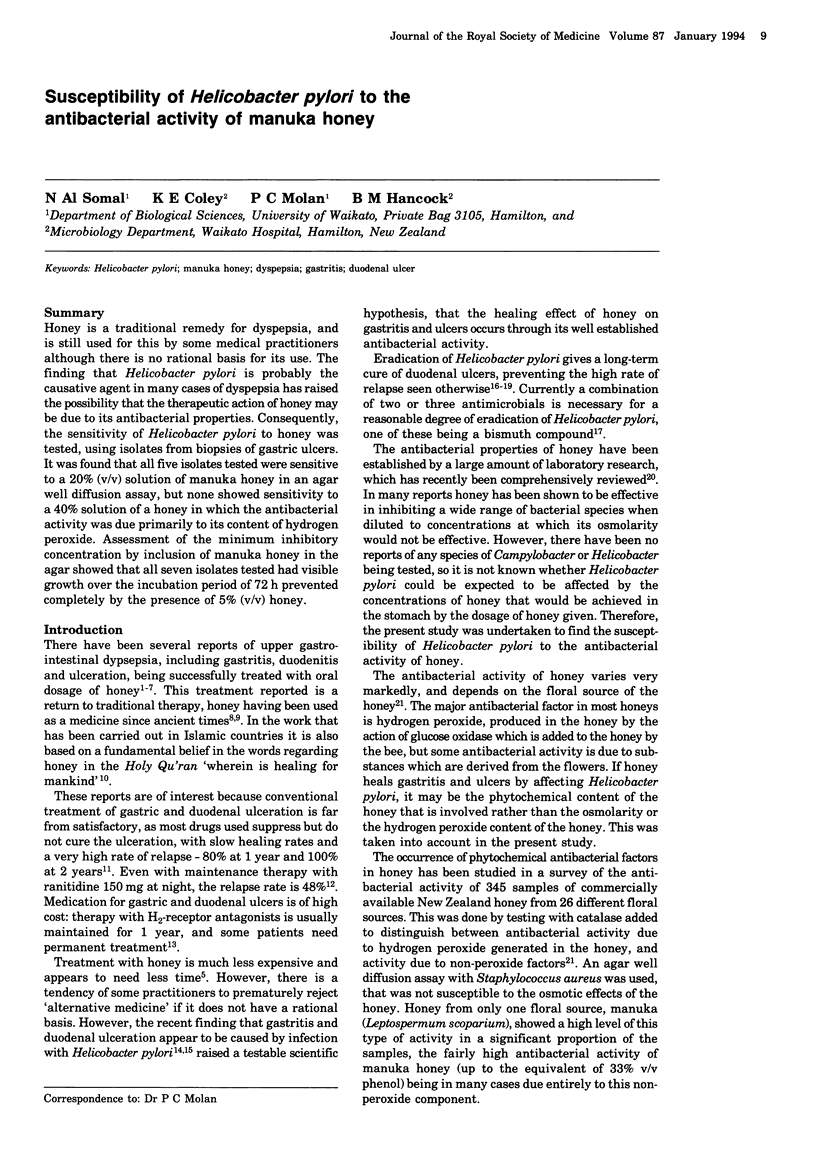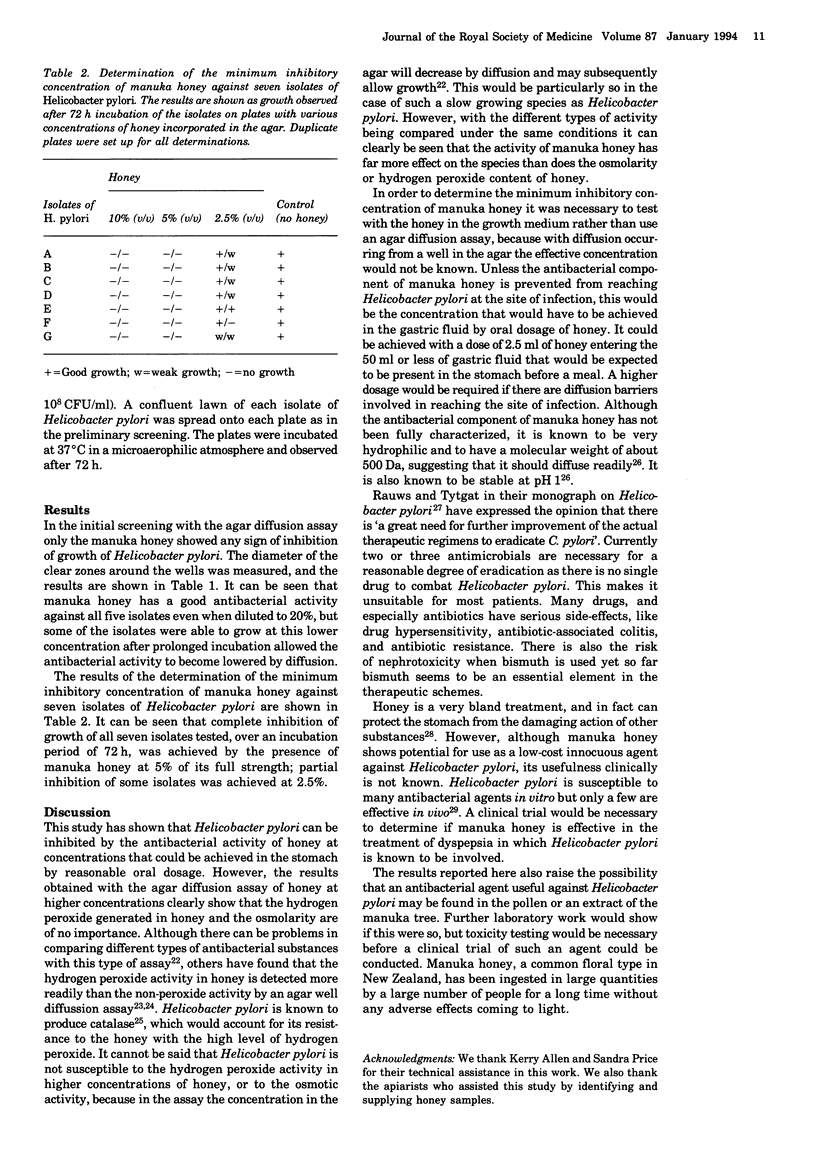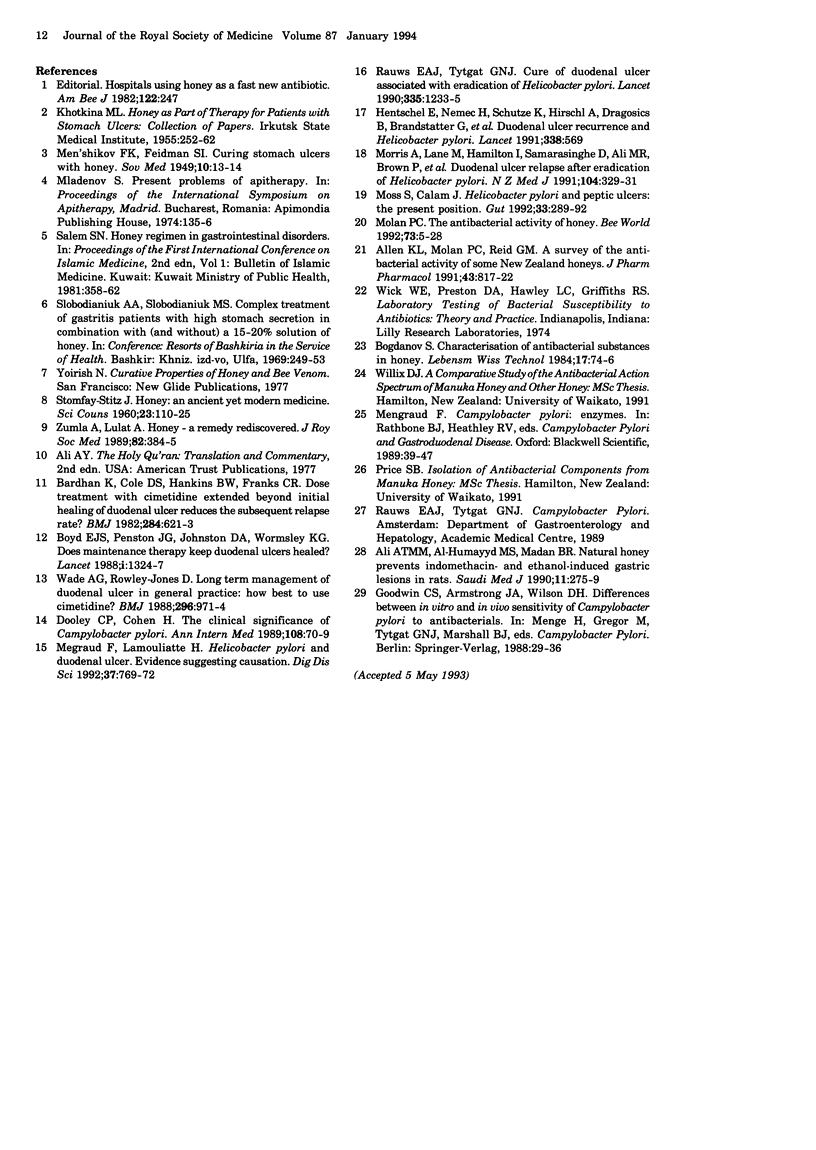Abstract
Honey is a traditional remedy for dyspepsia, and is still used for this by some medical practitioners although there is no rational basis for its use. The finding that Helicobacter pylori is probably the causative agent in many cases of dyspepsia has raised the possibility that the therapeutic action of honey may be due to its antibacterial properties. Consequently, the sensitivity of Helicobacter pylori to honey was tested, using isolates from biopsies of gastric ulcers. It was found that all five isolates tested were sensitive to a 20% (v/v) solution of manuka honey in an agar well diffusion assay, but none showed sensitivity to a 40% solution of a honey in which the antibacterial activity was due primarily to its content of hydrogen peroxide. Assessment of the minimum inhibitory concentration by inclusion of manuka honey in the agar showed that all seven isolates tested had visible growth over the incubation period of 72 h prevented completely by the presence of 5% (v/v) honey.
Full text
PDF



Selected References
These references are in PubMed. This may not be the complete list of references from this article.
- Allen K. L., Molan P. C., Reid G. M. A survey of the antibacterial activity of some New Zealand honeys. J Pharm Pharmacol. 1991 Dec;43(12):817–822. doi: 10.1111/j.2042-7158.1991.tb03186.x. [DOI] [PubMed] [Google Scholar]
- Bardhan K. D., Cole D. S., Hawkins B. W., Franks C. R. Does treatment with cimetidine extended beyond initial healing of duodenal ulcer reduce the subsequent relapse rate? Br Med J (Clin Res Ed) 1982 Feb 27;284(6316):621–623. doi: 10.1136/bmj.284.6316.621. [DOI] [PMC free article] [PubMed] [Google Scholar]
- Boyd E. J., Penston J. G., Johnston D. A., Wormsley K. G. Does maintenance therapy keep duodenal ulcers healed? Lancet. 1988 Jun 11;1(8598):1324–1327. doi: 10.1016/s0140-6736(88)92131-9. [DOI] [PubMed] [Google Scholar]
- Dooley C. P., Cohen H. The clinical significance of Campylobacter pylori. Ann Intern Med. 1988 Jan;108(1):70–79. doi: 10.7326/0003-4819-108-1-70. [DOI] [PubMed] [Google Scholar]
- Hentschel E., Nemec H., Schütze K., Hirschl A., Dragosics B., Brandstätter G., Taufer M. Duodenal ulcer recurrence and Helicobacter pylori. Lancet. 1991 Aug 31;338(8766):569–569. doi: 10.1016/0140-6736(91)91130-m. [DOI] [PubMed] [Google Scholar]
- Morris A., Lane M., Hamilton I., Samarasinghe D., Ali M. R., Brown P., Nicholson G. Duodenal ulcer relapse after eradication of Helicobacter pylori. N Z Med J. 1991 Aug 14;104(917):329–331. [PubMed] [Google Scholar]
- Moss S., Calam J. Helicobacter pylori and peptic ulcers: the present position. Gut. 1992 Mar;33(3):289–292. doi: 10.1136/gut.33.3.289. [DOI] [PMC free article] [PubMed] [Google Scholar]
- Mégraud F., Lamouliatte H. Helicobacter pylori and duodenal ulcer. Evidence suggesting causation. Dig Dis Sci. 1992 May;37(5):769–772. doi: 10.1007/BF01296437. [DOI] [PubMed] [Google Scholar]
- Rauws E. A., Tytgat G. N. Cure of duodenal ulcer associated with eradication of Helicobacter pylori. Lancet. 1990 May 26;335(8700):1233–1235. doi: 10.1016/0140-6736(90)91301-p. [DOI] [PubMed] [Google Scholar]
- Wade A. G., Rowley-Jones D. Long term management of duodenal ulcer in general practice: how best to use cimetidine? Br Med J (Clin Res Ed) 1988 Apr 2;296(6627):971–974. doi: 10.1136/bmj.296.6627.971. [DOI] [PMC free article] [PubMed] [Google Scholar]
- Zumla A., Lulat A. Honey--a remedy rediscovered. J R Soc Med. 1989 Jul;82(7):384–385. doi: 10.1177/014107688908200704. [DOI] [PMC free article] [PubMed] [Google Scholar]



